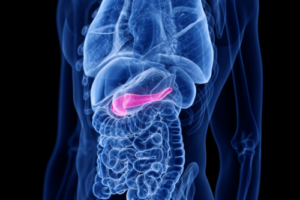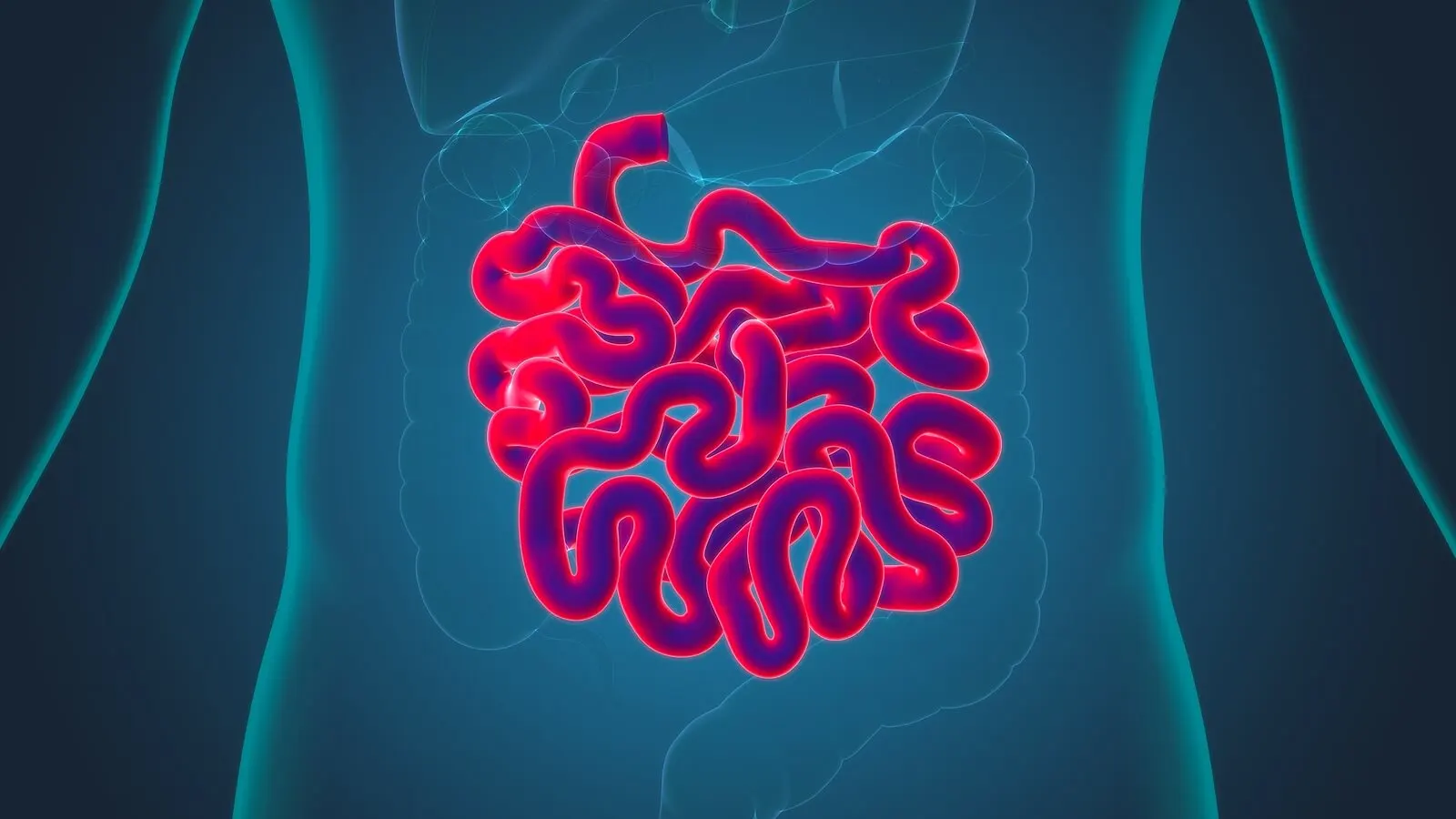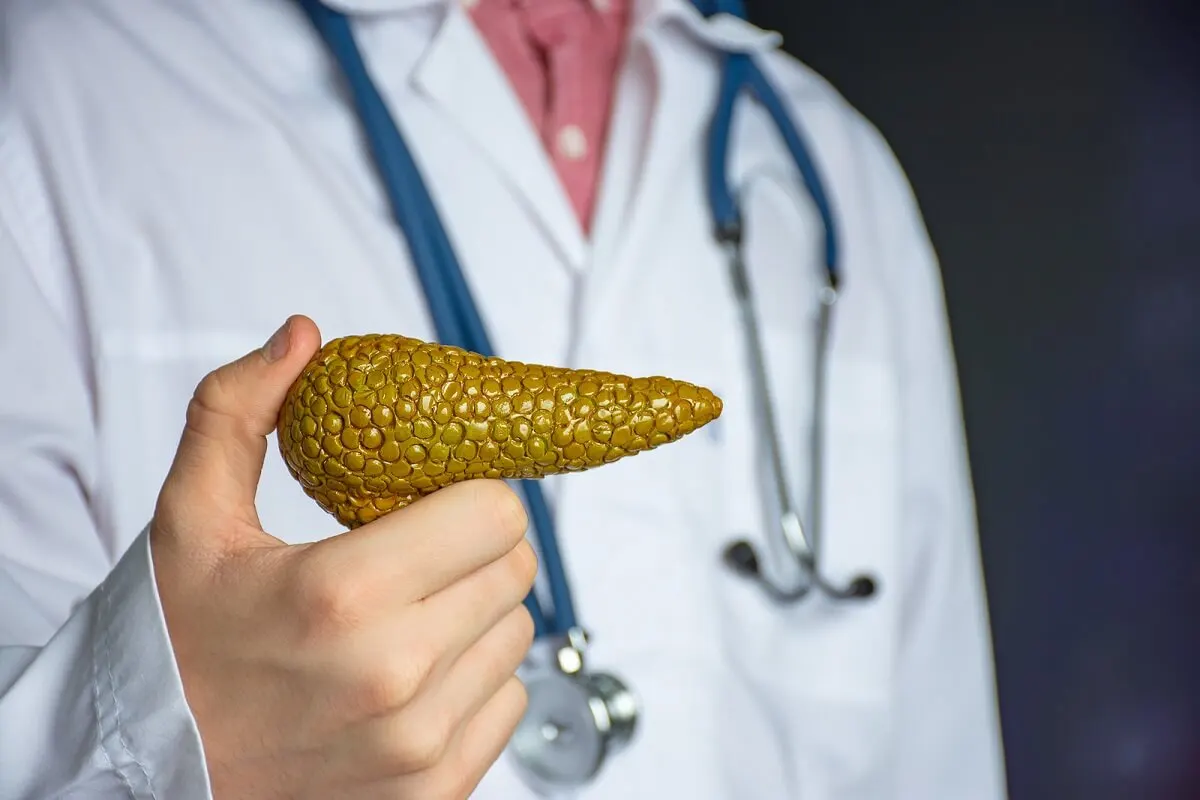Cholecystokinin Hormone: What Is It and What's It For?

Cholecystokinin is a hormone, also known as CCK ( cholecystokinin). It was formerly called pancreocytokinin, due to its stimulatory action on pancreatic secretion.
It’s produced in the duodenum, by the cells lining this portion of the small intestine. However, it’s also secreted in the brain by certain neurons and even in the hypothalamus. It has receptors in the central nervous system and in the digestive system.
In general terms, the functions of cholecystokinin are related to appetite control and digestion. It’s also considered a neurotransmitter, and recent research has attributed a role to it in anxiety disorders.
How is cholecystokinin produced?
The first studies on cholecystokinin date back almost a century. This hormone was identified in 1928 by Ivy and Oldberg in the gastric mucosal secretions of cats and dogs. In 1964, Jorpes and Mutt first isolated it and described its amino acid sequence.
Cholecystokinin is a peptide secreted by the mucosal cells of the duodenum. Although it’s also created in other segments of the small intestine, as well as there are producing nerves in the colon.
Cholecystokinin is stimulated by various polypeptides, triglycerides, glucides, hydrogen ions and calcium, through the parasympathetic pathway. CCK molecules are synthesized and released in a variety of ways. The coding gene is located on chromosome 3. In addition, a precursor of cholecystokinin has been identified in the small intestine.
Bioactive CCK peptides are derived from the last amino acid moiety of this precursor. Depending on the tissue where it’s found, there are different mixtures with different lengths. Molecular formulas have been described that differ in the number of amino acids: CCK-8, CCK-39, CCK-58. The main one is CCK-33.
It’s in the brain where most cholecystokinin is produced. And the neurons that make it are the most abundant compared to any other neuropeptide.

Read more here: Types of Hormones: Which Are the Most Important?
Cholecystokinin functions
Cholecystokinin has been found in equal proportion in the intestinal mucosa and in the brain. It is, therefore, presumed that its functions in the digestive system are as important as in the nervous system, although the latter aren’t yet understood in detail.
1. Regulation of appetite
Among the different types of hormones, there are the so-called enterohormones, of which cholecystokinin, together with secretin and gastrin, are a part. They regulate the secretory functions and motility of the digestive system, participating in the control mechanisms of hunger and satiety.
According to research, the stimuli that have the capacity to act on the hypothalamus, decreasing appetite and increasing energy expenditure, come from the gastrointestinal system. The substances involved are glucagon, bombesin, cholecystokinin and glucose.
Thus, the main function of cholecystokinin is related to digestion. In this sense, this hormone regulates the rate at which food is emptied from the stomach by acting on the pyloric sphincter. It also stimulates the production and delivery of bile, increasing the enzymes released by the pancreas.
Likewise, it favors the release of stomach acids that participate in the decomposition of ingested food. In addition, it fulfills the following metabolic functions:
- Helps regulate the passage of bile, relaxing the sphincter of Oddi.
- Relaxes the lower esophageal sphincter.
- Increases motility in the small intestine and colon.
- Increases the secretion of water and electrolytes in the intestines.
- Stimulates insulin release.
2. Hunger and satiety
Cholecystokinin exerts functions as a neurotransmitter and neuromodulator in the brain level. It’s considered to act on the satiety center, located in the medial hypothalamus, decreasing appetite. The satiety effect is mediated by the concentration of pancreatic enzymes in the intestine and lasts approximately 80 to 90 minutes.
Research suggests that the anorexigenic response is mediated by stimulation of CCK1 receptors located in the vagus nerve. This signal reaches the satiety center via the nucleus of the solitary tract and reduces the need for food intake.
3. Mood and anxiety disorders
The action of cholecystokinin on the central nervous system isn’t yet fully elucidated. It seems that it has anxiogenic and emotion-modulating functions in neuronal circuits.
There’s evidence that cholecystokinin released in the brain may have an impact on anxiety, since CCK agonists administered produce anxious responses. On the other hand, it could play a role in inhibiting or increasing dopamine levels, which in turn would have an impact on mood.
Continue reading: The Connection Between Hormones and Headaches
What happens when there are alterations in cholecystokinin levels?
Lower than normal levels of cholecystokinin have been found in some obese people. This CCK deficiency has been described as part of the autoimmune polyglandular syndrome.
So far, it is known that elevated serum levels of altered cholecystokinin may indicate exocrine pancreatic insufficiency, so CCK levels are tested for diagnosis or detection of this pathology. On the other hand, research has analyzed the physiological role of CCK in Ewing’s sarcoma, demonstrating that it acts as a malignant growth factor.
Altered cholecystokinin values have also been determined in individuals with endocrine tumors. Especially when they’re pituitary formations, thyroid carcinomas, and pancreatic tumors.
Finally, there’s evidence that cholecystokinin expression within the brain may play a key role in the pathogenesis of certain types of schizophrenia. However, further research is needed.

Relationship between cholecystokinin and Alzheimer’s disease
A recent study published in the journal Neurobiology of Aging demonstrated that elevated levels of cholecystokinin may prevent Alzheimer’s disease. Because it’s synthesized in the hippocampus, it functions as a key neurotransmitter in memory maintenance.
The study was conducted on 287 different people. Higher cholecystokinin scores were associated with a lower likelihood of cognitive impairment and Alzheimer’s disease. In addition, these people had better overall scores, a greater amount of gray matter and better memory.
The appetite hormone and anxiety
The hormone cholecystokinin is involved in appetite control, although experts believe it can also be related to anxiety and panic.
There are people with high levels of cholecystokinin who don’t show symptoms of any disorder or disease. However, studies are still being conducted to know how much of a determinant it is in obesity and general health.
If you think you’re having anxiety or appetite disorders, you should go to see an endocrinologist to assess whether your hormones may be affecting you. A simple lab test will clear up this issue.
All cited sources were thoroughly reviewed by our team to ensure their quality, reliability, currency, and validity. The bibliography of this article was considered reliable and of academic or scientific accuracy.
- Arteche I. Trastornos de la motilidad: una visión desde la sintergética. Medwave. 2007; 7(8): e3252. doi: 10.5867/medwave.2007.08.3252.
- Carranza L. Fisiología del apetito y el hambre. Enfermería Investiga. 2016; 1(3): 117-124.
- Crawley J, Corwin R. Biological actions of cholecystokinin. Peptides. 1994; 15(4): 731–755.
- Dockray G. Cholecystokinin. Current Opinion in Endocrinology, Diabetes and Obesity. 2012; 19(1): 8-12.
- González M, Ambrosio K, Sánchez S. Regulación neuroendócrina del hambre, la saciedad y mantenimiento del balance energético. Medigraphic Artemisa. 2006; 8(3): 191-200.
- Rehfeld J. Cholecystokinin-From local gut hormone to ubiquitous messenger.Frontiers in Endocrinology. 2017; 8: 1-8.
- Strader A, Woods S. Gastrointestinal hormones and food intake. Gastroenterology 2005; 128: 175-191.
- Smith J, Solomon T. Cholecystokinin and pancreatic cancer: The chicken or the egg? American Journal of Physiology – Gastrointestinal and Liver Physiology. 2014; 306(2): 1-46.
- Crespo C, González M, Fontans S, Romaní M, et al. Las hormonas gastrointestinales en el control de la ingesta de alimentos. Endocrinología y nutrición. 2009; 56 (6): 317-330.
- Plagman A, Hoscheidt S, McLimans KE, Klinedinst B et al. Cholecystokinin and Alzheimer’s disease: a biomarker of metabolic function, neural integrity, and cognitive performance. Neurobiol Aging. 2019 Apr;76:201-207.
This text is provided for informational purposes only and does not replace consultation with a professional. If in doubt, consult your specialist.








